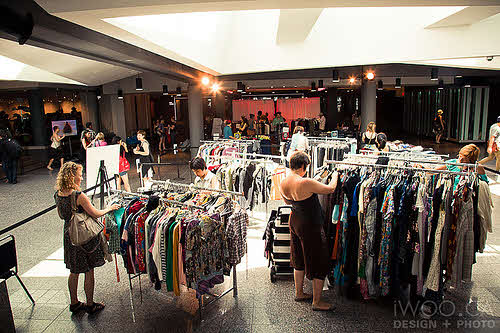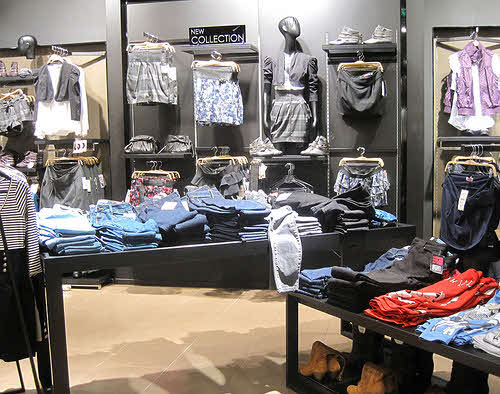Environmentally-conscious fashionistas, designers and activists should take note of the influence they’re having on big brands and the fashion industry as a whole. Their unified voices have pressured at least thirteen global retailers to ‘detox’ their garment supply chains and forced companies buying clothing produced in Bangladeshi factories to sign Clean Clothes’ Accord on Fire and Building Safety.
Mainstream markets can’t continue to do business as usual and ignore customers’ demands for sustainable clothing. They risk irreversible damage to their reputations and loss of profits. And at the end of the day all businesses, sustainable or not, must make a profit to be successful.
We’re seeing more attempts to educate customers about the lifecycle of their garments and how they can give back to the environment through their purchases than ever before. H&M launched “Don’t Let Fashion Go to Waste”, a clothing recycling program, in December to encourage its customers to return any old, worn disregarded fashions to their stores. Shoppers then get a voucher to receive a percentage off of their next purchase. Puma began its version of a similar program, “Bring Me Back”, to inspire its customers to recycle their used clothing and shoes. The company then uses the donated materials to create InCycle, the first closed-loop biodegradable and/or recyclable collection. ‘Closed loop’ means the waste from recycled items are used to make new clothing, which in turns reduces the consumption of oil, water and other natural resources. While these efforts are a step towards a more eco-friendly fashion standard, there still remain some limitations to this new way of shopping.
Obstacles to Overcome to Make Sustainable Fashions Available to Everyone
H&M’s Cecilia Brannsten, project manager of the company’s sustainability team, shared in an interview how she believes the industry can improve going forward. She thinks customers’ acceptance of recycled textiles created into new garments are ‘small’ and more technological advances in the fiber recycling field could be the missing link needed to lessen the now 21 billion pounds of post-consumer waste collected in landfills each year.
When members of the British Fashion Council, Estethica, met at London’s Fashion Week earlier this year they listed the following as their wish list to achieve large scale sustainability: ‘traceability, more government intervention, brand consistency looking down the supply chain, more senior management awareness about sustainability and sustainability better defined so it’s not seen as an exclusive or guilt purchase’, among other obstacles to overcome.
With that being said, “slow fashion” is undeniably making an impact on the fashion world, but it’s not enough to only open a store with ethically-made garments. Shoppers need to continue to donate and/or recycle used clothing and become more educated about the lifecycles of their purchases until closed-loop fashions are available for everyone. Sustainable apparel is affordable, stylish and may soon be available in stores around the world.

What do you think are some of the other limitations to making sustainable fashions a mainstream staple in every department store, boutique and online shop? Let me note in the comment section; I’d love to hear from you.
Image credits: thinkretail via photopin cc; The SWAP Team via photopin cc


Megan Schmidt
This is a great article! Considering the fact that the fashion industry is the second largest global industry, just behind automobiles, it really is important for consumers, purchasers and designers to demand more sustainability in the clothes we all wear. At Virginia Commonwealth University, we actually have classes in our Department of Fashion Design and Merchandizing that specifically educate students about the future of the industry and encourage them to think sustainably.
On a personal note, I think it’s also important for consumers to think about where their clothes are going after they’ve gone out of style or sat in someone’s closet for too long. They should never end up in landfills when there are so many other options for reusing them.
Marty
While we applaud efforts by fast-fashion purveyors to clean up their act, their underlying business model based on high-turnover, low-cost apparel is ultimately unsustainable. It falls to all of us as consumers to recognize that fulfillment can’t be found on a garment rack and that unless we scale back our consumption of goods, planetary pollution and worker abuse will remain the norm.
Diane C
Manufacturers just want to sell more clothes and shoes. If your take a look in your closet, how many items can be repaired? The shorts I’m wearing are denim (long lasting) but the waistband almost precludes replacement of elastic. I’m still wearing shorts and slacks where I’ve replaced the elastic that are over 40 years old. I can’t buy shoes that can be resoled. Does any manufacturer even offer leather soles? We should be able to purchase classic styles that are easy to repair so we can get our use out of them.
Henrik Eggert
You see good initiatives as honestby.com being another approach to produce great fashion, yet providing complete transparency to the consumer. And it’s always good with some responsibility from the big brands towards bringing our total footprint down. I still feel that there’s something missing in the middle. eBay is an option for re-cycling what’s still good, yet not used anymore, to refresh your own closet. I would like to see more alternatives to re-cycling the good things you have in a space where the passion for fashion and sustainability has been established already as kind of code-of-conduct. What spaces are out there today along those lines, any experience?
Peter McCaughan
Thanks
for nice blog. SizeGenie is your personal body scanner. Quickly and accurately take your measurements so you always get the perfect fit when buying clothes online. Body-Cloud is the creator of SizeGenie, with a Kickstarter campaign on the way aiming to change fashion shopping for good.